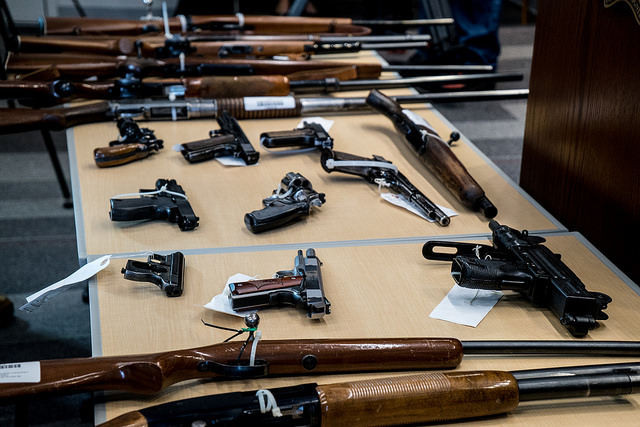A coalition from Quebec is calling on the Trudeau government to live up to its promises on gun control. The group includes survivors of the Montreal Polytechnique massacre in 1989, and of the more recent fatal shooting at the Quebec City Mosque. They want the government to recognize “the human costs of weak laws, including flaws related to possession permits, gun sales and the availability of assault weapons.”
Now, to be clear, the Liberals did not promise much on gun control in 2015. In fact, they pointedly promised not to reinstitute the previous Chrétien Liberal government’s long gun registry, which the Harper folks abolished.
The Trudeau Liberals made a number of low-profile, small-bore promises on guns. The most consequential of those was that they would “immediately implement the… gun marking regulations that have been repeatedly delayed by Stephen Harper.” Halfway through the Liberal mandate, it appears that a tendency to delay on that simple measure, which some experts say might even be even more effective than a gun registry, is a habit of federal governments, regardless of their political stripe.
Last May, the Canadian Press reported that the Trudeau government had deferred regulations on gun marking until the end of 2018. The reason? According to a document the Canadian Press obtained through Access to Information, the reason is vigorous opposition from the “firearms community.”
In the United States, the pro-gun lobby relies on constitutional arguments, based on the famous (or notorious) Second Amendment. In Canada, gun makers and sellers have a more mundane concern — cost. They make wildly inflated claims that it could cost up to $250 per gun to engrave the required markings. Federal government documents cite a far lower figure, about $20 per gun.
The payoff of this low-cost procedure would be significant, according to University of Ottawa criminology professor Irvin Waller. During the last election campaign Waller was quoted as saying gun markings would make it “much easier for the police or Canadian Border Service Agency to trace the origins of guns. This will make it a lot easier to trace the sort of guns that are being smuggled across borders, the sort of guns that get into the hands of the mafia and street gangs.”
The current government is not convinced, however, judging by its decision to delay a measure it had promised to institute “immediately.”
A political lobby with influence out of proportion to its numbers
The Trudeau government’s skittishness on guns underscores the awkward politics of the issue.
Few gun owners, it seems, share my friend Bill Crosbie’s view. Bill is a Newfoundlander who used to enjoy hunting for moose and caribou. He respected the province’s strict regulations, used all of any animal he killed, and happily registered his rifles according to federal rules, after those rules came into effect during the 1990s. Bill may have been a gun owner and hunter, but he was never a gun voter.
A good many of Bill’s fellow hunters seem to be much more easily offended by such mild requirements as registering their firearms. As a group, they are noisy, voluble and unyielding in their opposition to any restrictions on their weapons. And they have politicians of all parties running scared.
Again, here in Canada we are different from the U.S., where pro-gun rhetoric centres on the right to “defend” oneself with handguns and automatic weapons of war. Canadian gun people are, for the most part, hunters, not armed militia members. Indeed, in the case of Canadian Indigenous gun owners, they do not hunt primarily for sport. They do it for food. This writer lived in a northern Indigenous village for two years, and has visited many others. He knows that without the meat guns provide people in those communities would almost certainly suffer from malnutrition.
Still, Canadian gun lobbyists, however benign they may be compared to their American cousins, have outsized political influence. Their votes are crucial in rural ridings throughout the country.
That is one reason why, in the early 1990s, all save one of the NDP’s members of parliament voted against the Chrétien government’s gun legislation. Most of that small group of NDPers represented rural or partly rural western ridings, and gun control, in any form, was a non-starter for their voters. During the last election campaign, the NDP backed away from an earlier pledge to reinstate a revised version of the gun registry.
For most urban and suburban voters, control of long guns is just one on a long list of issues that determine their vote — and it is usually fairly low on the list. Politicians have little to fear from them when they pander to single-minded and almost obsessive gun advocates. And so, pander they do.
If all gun owners shared one Newfoundlander’s enlightened and relaxed attitude, we might still have a federal long gun registry — or, if we did not, because the Conservatives had abolished it anyway, we might now have new and robust gun control measures, such as gun marking.
The view of the newly formed Quebec gun control coalition is that while they probably cannot change the gun lobby’s mind, they can put equally strong pressure on the government to take common sense measures to deter gun violence. But will their voices, and their genuine personal anguish, be loud enough to drown out the noise from the other side?
Photo: Province of British Columbia
Chip in to keep stories like these coming.




